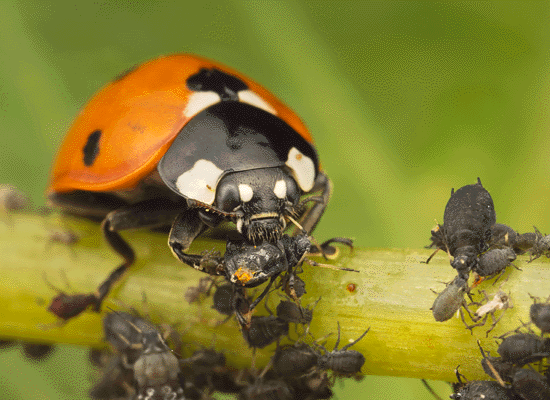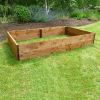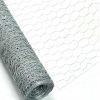Organic Pest Control
Organic Gardening's first principle is to avoid the use of chemicals in the garden. This is essential for the health of our soil, mammals, insects, organisms & the environment as a whole.
In-organic garden chemicals include any herbicides, weed controls, pesticides, fungicides or fertilizers that do not derive from a natural source. These chemicals can influence & damage or plant & animal life and create an imbalance in ecosystems.

Because pest control has mostly been carried out by the use of such chemicals, it can be difficult to change our ways or to find & develop new practices in pest control. There are, however so many options open to gardeners to protect their crops without the use of chemicals. Pest control methods can be broken down into 4 categories:
1. Chemical control - In organic gardens, only naturally derived chemicals can be used
2. Physical barrier - This simply means preventing pests from coming into contact with crops
3. Biological control - Involves using other plants & insects to keep pests under control
4. Cultural control - This is in regard to how we garden on a daily basis to prevent pest problems
Chemical control
In organic gardening, our range of chemicals is limited. See our section on chemicals for organic gardening for a full list of chemicals that can be used in organic gardening in Ireland.
Chemicals that are man made or not from a natural source can harm our soils & we do not yet know the full extent of the damage they can cause.
When using chemical pest control over 95% of the chemical misses it's target location & hence is wasted, washed down into the soil and into our waterways.
Pest control chemicals are also not specific to one insect, fungi or organism and hence if ingested by another organism other than the intended pest it could harm them too. This will in the long run reduce our bio diversity & lead to an imbalance of organisms.
Phyiscal Barriers
No doubt these such practices have been used since the beginning of organised farming some 12,000 years ago. So even if some of these ideas may seem new, they probably aren't. One thing that can be said about the following methods is that they are more suited to a smaller garden than large scale production.
Today we use a range of garden nettings in different gauges for control against different pests. Carrot fly can be controlled by the use of a fine mesh (spacing 1.35mm) while caterpillars or thier adult butterfly can be controlled by using a larger netting (spacing 20mm). Both these products simply work by keeping the pest off the crop.
Other Phyiscal barriers include
- Fly Paper Tape & Sticky Boards (White Fly & Aphids)
- Raised Beds (Carrot Fly)
- Cabbage Collars (Cabbage Root Fly)
- Scare Crows
- Folded Burlap (Gypsy Moth Caterpillars)
- Grease Band (Wholly Aphids)
- Copper Bands (Slugs)
- Grit, Sand, Egg Shells, Old Hair, Ashes, Salt (Slugs & Snails)
Biological Control
This is surely the most satisfying control of them all,and is a process of letting nature take it's course. It involves working with nature - again a founding principle of organic gardening and aims to achieve a balance of nature.
Biological control options would first have to be introduced by man, but once in place they would hopefully become established and no further application should be needed. These control options involve the use of what is called 'natural enemies'. These are the good insects that control the bad insects or pests.
We must protect these natural enemies, ensuring to conserve their food store, habitat & reducing chemical use that may harm them.
Some Biological Control Options
- The Song Bird - Eats Caterpillars & Slugs
- Lacewings - Eats Whitefly, BlackFly, Greenfly, Mites, Trhips, Mealy Bugs, Leaf Hopper & Caterpillar Eggs
- Laybirds - Eats Whitefly, BlackFly, Greenfly, Scale Insects & Small Caterpillars
- Hoverfly - Eats Mites & Aphids
- Ichneumonid Wasp - Eat Caterpillars
- Parasitic Nematode - Such as the Phasmarhabditis Hermaphrodita - Eats Slugs & Snails
- Frogs & Toads - Eats Woodice (Not a Pest) & Slugs (Major Pest)
- Moles & Mice - Eat Grubs, Slugs & Snails
- Hedgehogs - Eat Slugs & Snails & Other Small Insects
Cultural Control Options
This is simply the day to day activities of a gardener as well as the long term planning & how the garden is run to prevent pests. Cultural control can involve changing our own perceptions and views of gardening. One such idea is that we should come to except a certain amount of pest damage to our crops and not dump a cabbage on the first sight of a caterpillar.
Hygiene is probably the most significant, this is for both weed & pest control. It is important to clear away old leaves, remove old unharvested crops, dig all potatoes from the ground and dispose of them properly. This is to avoid carrying disease over from one year to the next.
Keep areas around crops free of long grass as this can be home to slugs and snails - the downside of this is that you may be removing the habitat of benefical insects or natural enemies too.
Crop rotation is essential whether organic or not.
Other Cultural Control Options
- Choice of Crop & Variety
- Correct Soil Managment - The Key to Organic Gardening
- Regular Inspection of Crops
- Intercropping









